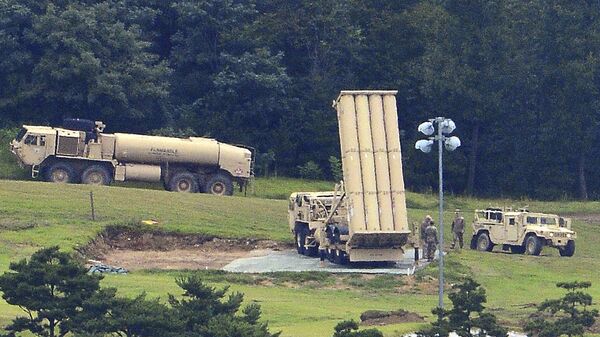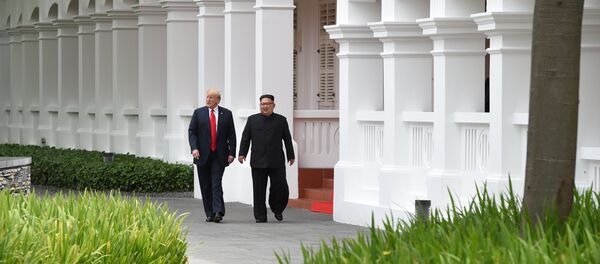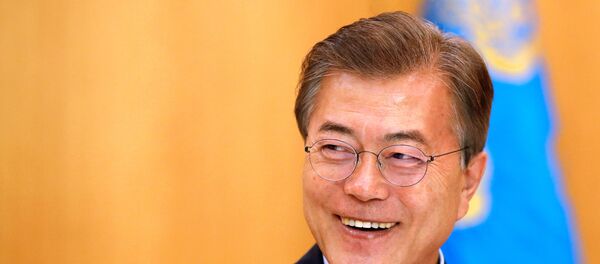On June 12 North Korea clearly signaled its determination to carry out the denuclearization of the Korean Peninsula, therefore, at this stage, the proposal to mitigate sanctions against the Democratic People's Republic of Korea (DPRK) is quite reasonable, Lu Chao, head of the Center for North Korean and Republic of Korea Studies at the Liaoning Academy of Social Sciences, told Sputnik China.
"Previously, the international community imposed sanctions on the DPRK because of its nuclear tests," Lu said. "However, North Korea has already responded positively to the idea of the denuclearization of the Korean Peninsula. In this case, the UN Security Council should also reconsider sanctions against the DPRK, up to the introduction of appropriate adjustments. Of course, the UN Security Council should take a decision on a relevant discussion [on the issue]. We can say that the DPRK's efforts to conduct the denuclearization are obvious. In particular, we are talking about the dismantling of [Pyongyang's] nuclear test site in May this year."
Speaking at the UN Security Council on May 13, Russian UN Ambassador Vassily Nebenzia raised the anti-DPRK sanctions issue, suggesting that the Security Council should consider steps to lift restrictions against Pyongyang.
"I think that it is only natural that we should be thinking about steps in that direction," Nebenzia told reporters. "There is progress on the track that should be reciprocal. There should be a two-way street. Of course the other side should see encouragement to go forward."
On June 13 Secretary of State Mike Pompeo confirmed that joint U.S.-South Korea military exercises had been suspended, adding that the drills would be resumed in case Pyongyang stops negotiations over the nuclear program.
The next day, however, Pompeo clarified that the sanctions against Pyongyang would not be lifted until the "complete, verifiable and irreversible" denuclearization of North Korea.
"We believe that Kim Jong Un understands the urgency… that we must do this quickly," Pompeo said.

US Can't Implement Kim-Trump Accords Without China
Speaking to Sputnik, Russian political analyst Alexander Lomanov emphasized Beijing's role in the US-North Korean talks. It is likely that the US secretary of state's upcoming visit to China will be devoted to both the outcomes of the Singapore Summit and the subsequent implementation of the Washington-Pyongyang agreement.
However, the discussion of this sensitive issue is overshadowed by the White House's pledge to impose "a 25 percent tariff on $50 billion of goods imported from China containing industrially significant technology, including those related to the 'Made in China 2025' program" on June 15 and 30, respectively.
"The US intention to impose political pressure and harm the Chinese economy at the same time enlisting China's support in solving the North Korean problem is a very bold and daring plan," Lomanov opined. "It may not strike a chord with Beijing, because [the Chinese] still believe that usually partners do not engage in the destruction of economic ties."
The main problem remains: the US is demanding that the DPRK take real steps in exchange for verbal promises, Lomanov pointed out. The analyst underscored that Washington had repeatedly demonstrated that its words do not always translate into actions. Thus, the absolute asymmetry of these agreements will be evident soon, he believes. He added that one should not delude oneself into believing that the DPRK will disarm under Washington's verbal guarantees.
However, according to Lomanov, China could ensure North Korea's disarmament. Still, Beijing would not do it for nothing: The analyst presumed that the Chinese leadership may demand that the US redeploy its Terminal High Altitude Area Defense (THAAD) systems outside South Korea and reduce the US military contingent on the peninsula.
In any event, given China's historic ties with North Korea Washington needs Beijing's assistance in implementing the Trump-Kim accords, Lomanov emphasized.
The US installed the THAAD complex in South Korea in 2017 under the pretext of tacking North Korea's missile threat. The move was criticized by both China and Russia, which cited serious security concerns and warned Washington against escalating tensions in the region.
The views and opinions expressed by Lu Chao and Alexander Lomanov are those of the contributors and do not necessarily reflect those of Sputnik.





